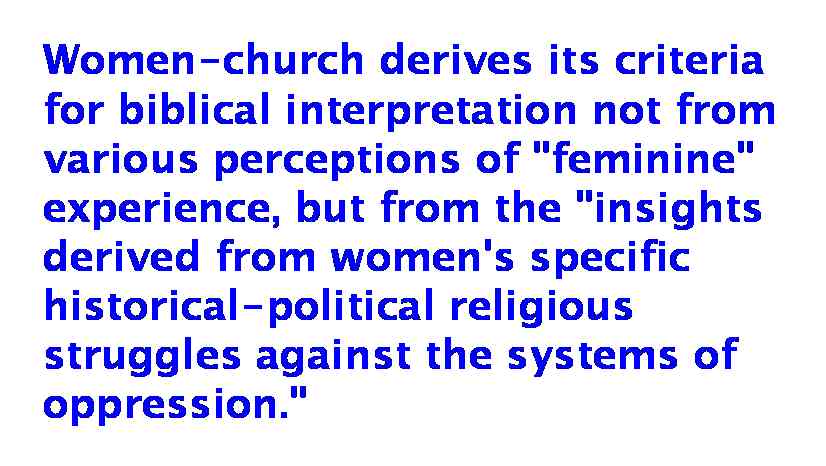WHAT
ABOUT EXPERIENCE? (E) WOMEN-CHURCH
(Chapter
4, section E)
For the full contents of "Authority in Feminist Biblical Interpretation" by Beryl Donnan, and other online sections see here.
 Fiorenza
discerned early on that there would need to be a great change in
ecclesial and
theological institutions to allow women's experience and presence into
the
church.[1] Recognising the unlikelihood of such
change she expressed the need to move from a reconstructive
hermeneutics of
remembrance to a hermeneutics of creative actualisation which would use
all
forms of artistic imagination to amplify feminist remnants from the
perspective
of the discipleship of equals. "Only by
reclaiming our religious imagination and
our sacred power
of naming can women-church 'dream new dreams and see new visions'."[2] The example she chooses to conclude But
She Said
- Alice
Walker's poetic reflection on the healing of the woman bent double in
terms of
a black woman's transformation - indicates the quest for "justice"
and "hope" for the future, that characterises her vision of
women-church
as a "rhetorical space".
Fiorenza
discerned early on that there would need to be a great change in
ecclesial and
theological institutions to allow women's experience and presence into
the
church.[1] Recognising the unlikelihood of such
change she expressed the need to move from a reconstructive
hermeneutics of
remembrance to a hermeneutics of creative actualisation which would use
all
forms of artistic imagination to amplify feminist remnants from the
perspective
of the discipleship of equals. "Only by
reclaiming our religious imagination and
our sacred power
of naming can women-church 'dream new dreams and see new visions'."[2] The example she chooses to conclude But
She Said
- Alice
Walker's poetic reflection on the healing of the woman bent double in
terms of
a black woman's transformation - indicates the quest for "justice"
and "hope" for the future, that characterises her vision of
women-church
as a "rhetorical space".Her
conception of ekklesia gynaikon is not intended to be exclusionary, but
a
political oppositional term to patriarchy.[3] The term was coined "in order to
assert that although silenced by the patriarchal church, women are
church -
ekklesia - and we always have been church."[4] The term has been widely adopted and
variously misunderstood. Fiorenza
does not intend to suggest an alternative "spiritual home" or a
gendered sectarian body. She
intends ekklesia to suggest a political valence - the democratic
congress of
self-governing citizens,[5]
a place of radical equality, "a site of feminist struggles for
transforming society and institutions." "It
is at once an historical and an imagined reality,
already partially realised but still to be struggled for."[6] It derives its criteria for biblical
interpretation not from various perceptions of "feminine" experience,
but from the "insights derived from women's specific
historical-political
religious struggles against the systems of oppression."[7]
This
later "rhetorical" conception of women-church with its "multiple
discourses", is important not only in clarifying the concept, but in
accommodating the diversity of feminist experience which was examined
earlier. But it is historical experiences
past
and present, specifically experiences of struggle against patriarchy,
that are
the focus. Its rhetorical
strategies of "liberation", "differences",
"equality" and "vision" "interrogate biblical texts
for religious visions that foster equality, justice and the logic of
the
ekklesia rather than that of patriarchal domination."[8]
[1]E. Schüssler Fiorenza,
'Feminist
Theology
as a Critical Theology of Liberation', in Theological Studies, Vol 36, 1975, p 620
[2]Fiorenza, Bread not Stone, p 21
[3]Fiorenza, Bread not Stone, p xiv
[4]Fiorenza, But She Said, p 127
[5]Fiorenza, But She Said, p 128
[6]Fiorenza, But She Said, p 130
[7]Fiorenza, But She Said, p 131
[8]Fiorenza, But She Said, pp 131-132